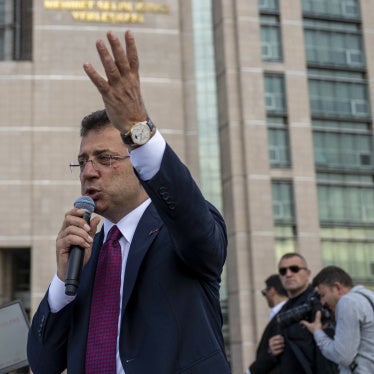(London, November 16, 2008) – The UK foreign secretary, David Miliband, should use his visit to Syria to raise human rights concerns, Human Rights Watch said today. In particular, Miliband should urge the Syrian government to release activists detained solely for exercising freedom of expression and association. He should also urge the Syrian authorities to make public all information about the violent suppression of a riot at Sednaya prison in July 2008.
Miliband will be the first high-level British official to visit Damascus since then-Prime Minister Tony Blair held talks with President Bashar al-Asad in October 2001. Miliband said at a news conference on November 13 that he had accepted the invitation after what he called “an important change in approach by the Syrian government, and notably the historic decision to exchange ambassadors with Lebanon.” He also said he had been pressing Syria for cooperation on counterterrorism, Lebanon, Iraq, and Middle East peace efforts.
“Syria may be changing its approach to the region, but it still has not changed the way it treats its people,” said Tom Porteous, London director of Human Rights Watch. “Miliband should insist that it improve its human rights record as a condition of warmer relations with the UK and European Union.”
Syria continues to operate under emergency rule imposed in 1963, and Miliband’s visit comes at a time of increased repression. On October 29, a Damascus criminal court sentenced a dozen leading democracy advocates to 30 months in prison on charges of “weakening national sentiment” and “spreading false or exaggerated news that would affect the morale of the country”. The authorities had detained the activists, including a former member of parliament, Riad Seif, after they participated in a meeting in December 2007 of the National Council of the Damascus Declaration for Democratic Change, an umbrella group of opposition and pro-democracy groups.
Two other prominent activists, Michel Kilo and Mahmud `Issa, are serving prison terms for having called in May 2006 for improved relations between Lebanon and Syria – one of the benchmarks Miliband has cited as an example of Syria’s progress.
In several recent speeches, Miliband has emphasized the UK’s support for human rights and said that the UK should be on the side of what he called “civilian surges,” those pushing for greater freedom and democracy in authoritarian states. Yet, at his news conference on November 13, Miliband did not mention any of the Syrians detained for pursuing greater freedom and democracy. Instead, he said the talks would focus on regional politics and counterterrorism.
“Michel Kilo and Mahmud `Issa are in prison for seeking the same thing that Miliband says the Syrians are supporting,” Porteous said. “The foreign secretary should be true to his words and get behind the ‘civilian surge’ in Syria.”
Syria’s security services continue a system of forced disappearances – detaining people arbitrarily and frequently refusing to disclose their whereabouts for weeks.
The Syrian authorities still restrict freedom of expression, and there is no independent press. The government has extended to online outlets restrictions it has traditionally applied to print and televised media, detaining and trying a number of journalists and activists for posting information online.
Karim `Arbaji, 29, the moderator of www.akhawia.net, a popular online forum for Syrian youth covering social and political issues, is facing trial before the State Security Court, charged with “spreading false information that may weaken national sentiment.” The Syrian government’s censorship extends to popular websites, such as www.facebook.com and www.youtube.com.
The authorities’ control of information in Syria is reflected in the complete blackout on any information concerning the prison riot that occurred at Sednaya prison in July. On the morning of July 5, Syrian military police opened fire on inmates at the military-run prison in an attempt to quell a riot that began following an aggressive prison search.
Four months after the incident, there is still no information about how the prison standoff ended, or the exact number and names of those killed and wounded. Human Rights Watch obtained the names of nine inmates who were believed killed. Syrian human rights organizations reported that as many as 25 may have been killed. The families of inmates have been unable to obtain any information about their relatives.
Human Rights Watch said that the British foreign secretary should urge his Syrian counterpart to order an independent investigation into the police’s use of lethal force at the prison and to make public immediately all information about the riot, including the names of those wounded or killed.








